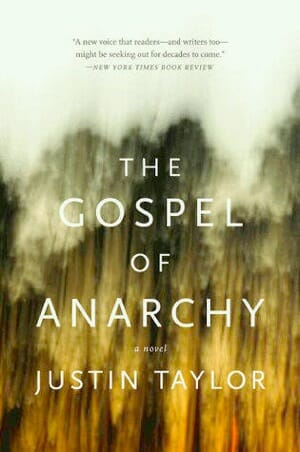The Gospel of Anarchy by Justin Taylor

An accidental messiah. An impromptu religious cult. Lives exalted and ruined in the crucible of faith.
Look what anomie has wrought.
In The Gospel of Anarchy, several self-marginalized men and women in their early 20s, disparate in origin but united by deep disaffection and a desire for purpose in their aimless lives, pour their hopes and energies into a bizarre belief system centered on the anarcho-Christian ruminations of a recently vanished acquaintance. The idealistic but directionless slackers coalesce into a group dedicated to living out and spreading the disappeared man’s curious doctrine, with doubters unceremoniously shoved aside. Justin Taylor, who won acclaim for his short story collection Everything Here is the Best Thing Ever and made Dzanc Books’ “20 Writers to Watch” list, has written an ambitious and haunting—though uneven and frustrating—novel about alienation and the uniquely human urge to graft meaning onto life.
Where’s Albert Camus when you need him? In his essay “The Myth of Sisyphus,” the late French existentialist claims that life has no meaning. As a result, he continues, it’s perfectly logical to kill oneself. But Camus also offers a way out, employing a Greek myth as an analogy. He argues that contentment and even happiness can be achieved through the realization that the struggle of life—much like Sisyphus’s task of rolling a boulder up a mountain, watching it roll back down, and repeating the process endlessly—makes each and every one of us an “absurd hero.”
Too bad the protagonists of The Gospel of Anarchy haven’t heard the news. Not because they grapple with a perception that life has no meaning, but because they’re determined—perhaps feel duty-bound—to invest it with meta-meaning. Taylor apparently intends his story as a commentary on the allure of ideology in our “era of the post-everything.”
The Gospel of Anarchy is set in 1999. Given the brief flurry of millenarianism at the time, this is a nice touch. But in general, whether in the run-up to 2000 or today, Americans aren’t trying to Escape from Freedom. (That’s the title of a famous work of political psychology examining flight from the terror and uncertainty of choice.) If they were, we’d see a good deal more Johnny Talibans and Adam Gadahns.
We would also frequently come across real-life replicas of the characters in this novel—they’re out there, of course, but not in great numbers. Intriguingly, Taylor’s characters don’t gravitate toward authoritarian belief systems. Instead, they find security in an egalitarian and anti-authoritarian pseudo-philosophy. Even so, their creed is no less dogmatic.
Set in Gainesville, Florida, The Gospel of Anarchy is initially narrated by David, who’s recently broken up with his girlfriend, dropped out of the University of Florida, gotten a dead-end office job and now spends his free time surfing Internet porn sites. When David runs into his old buddy Thomas, who’s dropped out of the same university and whom he’s not seen in a while, he finds himself drawn inexorably toward his friend’s alternative lifestyle. It isn’t just seeing Thomas happily foraging for food in the dumpster behind the local falafel joint while a punk girl keeps watch. David is invited to their house, where he’s seduced by the lusty yet spiritual Katy into a threesome with the punk girl. He promptly moves in.
A panoptic narrator, who will relieve David of storytelling duties until the book’s penultimate chapter before taking up the baton again for the finale, now introduces readers to the denizens of the house—“Fishgut,” after the Biblical story of Jonah’s sojourn in the belly of a whale. In addition to its permanent residents, Fishgut plays host to young transients and an older hippie couple who sleep in their van out front. Most share a vague dislike of the political establishment, feel estranged from society and its cultural norms, and sustain themselves through shoplifting, scrounging for food, and occasional paid work. Ironically, their lives will be transformed by someone no longer in their midst. The recently vanished Parker was unobtrusive—he camped out in a corner of Fishgut’s backyard. But he had an undeniable aura, and he melded together a host of Christian and anarchist ideas that enthralled Katy, the more so since his disappearance. She has decided that he’s a prophet, though he’d definitely balk at such a suggestion.
When a buried notebook is discovered in Parker’s former campsite in the backyard, Katy finds the sign she’s been waiting for. Parker didn’t abandon them. On the contrary, he entrusted his wisdom to them in writing, and will return once they have spread his message. Reinvigorated, Katy takes to propagating Parker’s anarcho-Christian teachings through various means, from printing and freely distributing an edited manuscript of his notebook musings dubbed the Good Zine to holding weekly meetings for the unenlightened masses at Fishgut.
Fittingly, the author delves into Parker’s beliefs. (Had they been left unexplored, the story might have felt inchoate.) Here’s an example of Parker’s view of the true anarchist as Christian and vice versa: “When Christ spoke of the fulfillment of the Law, he spoke of the obliteration of the law, because perfection means Stasis, which is Death. As the Christian triumphs over Death so the Anarchist over the Law—there is no difference or distinction between the obstacles, less still among those who triumph over them.”
-

-

-

-

-

-

-

-

-

-

-

-

-

-

-

-

-

-

-

-

-

-

-

-

-

-

-

-

-

-

-

-

-

-

-

-

-

-

-

-








































